- Home
- H. Beam Piper
Lord Kalvan of Otherwhen
Lord Kalvan of Otherwhen Read online
Lord Kalvan of
Otherwhen
H. Beam Piper
TORTHA Karf, Chief of Paratime Police, told himself to stop fretting. He was only three hundred years old, so by the barest life-expectancy of his race he was good for another two centuries. Two hundred more days wouldn’t matter. Then it would be Year-End Day, and precisely at midnight, he would rise from this chair and Verkan Vall would sit down in it, and after that he would be free to raise grapes and lemons and wage guerrilla war against the rabbits on the island of Sicily, which he owned outright on one uninhabited Fifth Level time-line. He wondered how long it would take Vall to become as tired of the Chief’s seat as he was now.
Actually, Karf knew, Verkan Vall had never wanted to be Chief. Prestige and authority meant little to him, and freedom much. Vall liked to work outtime. But it was a job somebody had to do, and it was the job for which Vall had been trained, so he’d take it, and do it, Karf suspected, better than he’d done it himself. The job of policing a near-infinity of worlds, each of which was this same planet Earth, would be safe with Verkan Vall.
Twelve thousand years ago, facing extinction on an exhausted planet, the First Level race had discovered the existence of a second, lateral, time dimension and a means of physical transposition to and from a near-infinity of worlds of alternate probability parallel to their own. So the conveyers had gone out by stealth, bringing back wealth to Home Time-Line a little from this one, a little from that, never enough to be missed anywhen.
It all had to be policed. Some paratimers were less than scrupulous in dealing with outtime races he’d have retired ten years ago except for the discovery of a huge paratemporal slave-trade, only recently smashed. More often, somebody’s bad luck or indiscretion would endanger the Paratime Secret, or some incident—nobody’s fault, something that just happened, would have to be explained away. But, at all costs, the Paratime Secret must be preserved. Not merely the actual technique of transposition—that went without saying—but the very existence of a race possessing it. If for no other reason (and there were many others), it would be utterly immoral to make any outtime race live with the knowledge that there were among them aliens indistinguishable from themselves, watching and exploiting. It was a big police-beat.
Second Level that had been civilized almost as long as the First, but there had been dark-age interludes. Except for paratemporal transposition, most of its sectors equaled First Level, and from many, Home Time Line had learned much. The Third Level civilizations were more recent, but still of respectable antiquity and advancement. Fourth Level had started late and progressed slowly; some Fourth Level genius was first domesticating animals long after the steam engine was obsolescent all over the Third. And Fifth Level on a few sectors, subhuman brutes, speechless and fireless, were cracking nuts and each other’s heads with stones, and on most of it nothing even vaguely humanoid had appeared.
Fourth Level was the big one. The others had devolved from low-probability genetic accidents; it was the maximum probability. It was divided into many sectors and subsectors, on most of which human civilization had first appeared in the valleys of the Nile and Tigris-Euphrates, and on the Indus and Yangtze. Europo-American Sector they might have to pull out of that entirely, but that would be for Chief Verkan to decide. Too many thermonuclear weapons and too many competing national sovereignties. That had happened all over Third Level at one time or another within Home Time Line experience. Alexandrian-Roman off to a fine start with the pooling of Greek theory and Roman engineering talent, and then, a thousand years ago, two half forgotten religions had been rummaged out of the dustbin and fanatics had begun massacring one another. They were still at it, with pikes and matchlocks, having lost the ability to make anything better. Europo-American could come to that if its rival political and economic sectarians kept on. Sino-Hindic—that wasn’t a civilization; it was a bad case of cultural paralysis. And so was Indo-Turanian—about where Europo-American had been ten centuries ago.
And Aryan-Oriental—the Aryan migration of three thousand years ago, instead of moving west and south, as on most sectors, had rolled east into China. And Aryan-Transpacific, an offshoot on one sector, some of them had built ships and sailed north and east along the Kuriles and the Aleutians and settled in North America, bringing with them horses and cattle and iron working skills, exterminating the Amerinds, warring with one another, splitting into diverse peoples and cultures. There was a civilization, now decadent, on the Pacific coast, and nomads on the central plains herding bison and crossbreeding them with Asian cattle, and a civilization around the Great Lakes and one in the Mississippi Valley, and a new one, five or six centuries old, along the Atlantic and in the Appalachians. Technological level premechanical, water-and-animal power; a few subsectors had gotten as far as gunpowder.
But Aryan-Transpacific was a sector to watch. They were going forward; things were ripe to start happening soon.
Let Chief Verkan watch it, for the next couple of centuries. After Year-End Day, ex-Chief Tortha would have his vineyards and lemon-groves to watch.
RYLLA tried to close her mind to the voices around her in the tapestried room, and stared at the map spread in front of her and her father. There was Tarr-Hostigos overlooking the gap, only a tiny fleck of gold on the parchment, but she could see it in her mind’s eye—the walled outer bailey with the sheds and stables and workshops inside, the inner bailey and the citadel and keep, the watchtower pointing a blunt finger skyward. Below, the little Darro flowed north to join the Listra and, with it, the broad Athan to the east. Hostigos Town, white walls and slate roofs and busy streets; the checkerboard of fields to the west and south; the forest, broken by farms, to the west.
A voice, louder and harsher than the others, brought her back to reality. Her cousin, Sthentros.
“He’ll do nothing at all? Well, what in Dralm’s holy name is a Great King for, but to keep the peace?”
She looked along the table, from one to another. Phosg, the speaker for the peasants, at the foot, uncomfortable in his feast-day clothes and ill at ease seated among his betters. The speakers for the artisans’ guilds, and for the merchants and the townsfolk; the lesser family members and marriagekin; the barons and landholders. Old Chartiphon, the chief-captain, his golden beard streaked with gray like the lead splotches on his gilded breastplate, his long sword on the table in front of him. Xentos, the cowl of his priestly robe thrown back from his snowy head, his blue eyes troubled. And beside her, at the table’s head, her father, Prince Ptosphes, his mouth tight between pointed gray mustache and pointed gray beard. How long it had been since she had seen her father smile!
Xentos passed a hand negatively across his face. “King Kaiphranos said that it was every Prince’s duty to guard his own realm; that it was for Prince Ptosphes, not for him, to keep bandits out of Hostigos.”
“Bandits? They’re Nostori soldiers!” Sthentros shouted. “Gormoth of Nostor means to take all Hostigos, as his grandfather took Sevenhills Valley after the traitor we don’t name sold him Tarr-Dombra.”
That was a part of the map her eyes had shunned the bowl valley to the east, where Dombra Gap split the Mountains of Hostigos. It was from thence that Gormoth’s mercenary cavalry raided into 14ostigos.
“And what hope have we from Styphon’s House?” her father asked. He knew the answer; he wanted the others to hear it at first hand.
“The Archpriest wouldn’t talk to me; the priests of Styphon hold no speech with priests of other gods,” Xentos said.
“The Archpriest wouldn’t talk to me, either,” Chartiphon said. “Only one of the upper-priests of the temple. He took our offerings and said he would pray to Styphon for us. When I asked for fireseed, he would give me n
one.”
“None at all?” somebody down the table cried. “Then we are indeed under the ban.”
Her father rapped with the pommel of his poignard. “You’ve heard the worst, now. What’s in your minds that we should do? You first, Phosg.”
The peasant representative rose and cleared his throat. “Lord Prince, this castle is no more dear to you than my cottage is to me.
I’ll fight for mine as you would for yours.” There was a quick mutter of approval along the table. “Well said, Phosg!”
“An example for all of us!” The others spoke in turn; a few tried to make speeches. Chartiphon said “Fight. What else.”
“I am a priest of Dralm,” Xentos said, “and Dralm is a god of peace, but I say, fight with Dralm’s blessing. Submission to evil men is the worst of all sins.”
“Rylla,” her father said. “Better die in armor than live in chains,” she replied. “When the time comes, I will be in armor with the rest of you.” Her father nodded. “I expected no less from any of you.” He rose, and all with him. “I thank you. At sunset we will dine together; until then servants will attend you. Now, if you please, leave me with my daughter. Chartiphon, you and Xentos stay.”
Chairs scraped and feet scuffed as they went out. The closing door cut off the murmur of voices. Chartiphon had begun to fill his stubby pipe.
“I know there’s no use looking to Balthar of Beshta,” Rylla said, “but wouldn’t Sarrask of Sask aid us? We’re better neighbors to him than Gormoth would be.”
“Sarrask of Sask’s a fool,” Chartiphon said shortly. “He doesn’t know that once Gormoth has Hostigos, his turn will come next.”
“He knows that,” Xentos differed. “He’ll try to strike before Gormoth does, or catch Gormoth battered from having fought us. But even if he wanted to help us, he dares not. Even King Kaiphranos dares not aid those whom Styphon’s House would destroy.”
“They want that land in Wolf Valley, for a temple-farm,” she considered. “I know that would be bad, but... “
“Too late,” Xentos told her. “They have made a compact with Gormoth, to furnish him fireseed and money to hire mercenaries, and when he has conquered Hostigos he will give them the land.” He paused and added “And it was on my advice, Prince, that you refused them.”
“I’d have refused against your advice, Xentos,” her father said. “Long ago I vowed that Styphon’s House should never come into Hostigos while I lived, and by Dralm and by Galzar neither shall they! They come into a princedom, they build a temple, they make temple-farms and slaves of everybody on them. They tax the Prince, and make him tax the people, till nobody has anything left. Look at that temple-farm in Sevenhills Valley!”
“Yes, you’d hardly believe it,” Chartiphon said. “Why, they even make the peasants for miles around cart their manure in, till they have none left for their own fields. Dralm only knows what they do with it.” He puffed at his pipe. “I wonder why they want Sevenhills Valley.”
“There’s something in the ground there that makes the water of those springs taste and smell badly,” her father said.
“Sulfur,” said Xentos, “But why do they want sulfur?”
CORPORAL Calvin Morrison, Pennsylvania State Police, squatted in the brush at the edge of the old field and looked across the small brook at the farmhouse two hundred yards away. It was scabrous with peeling yellow paint, and festooned with a sagging porch-roof. A few white chickens pecked uninterestedly in the littered barnyard; there was no other sign of life, but he knew that there was a man inside. A man with a rifle, who would use it; a man who had murdered once, broken jail, would murder again.
He looked at his watch; the minute-hand was squarely on the nine. Jack French and Steve Kovac would be starting down on the road above, where they had left the car. He rose, unsnapping the retaining-strap of his holster.
“Watch that middle upstairs window,” he said. “I’m starting now.”
“I’m watching it.” Behind him, a rifle-action clattered softly as a cartridge went into the chamber. “Luck.” He started forward across the seedling-dotted field. He was scared, as scared as he had been the first time, back in ’51, in Korea, but there was nothing he could do about that. He just told his legs to keep moving, knowing that in a few moments he wouldn’t have time to be scared.
He was within a few feet of the little brook, his hand close to the butt of the Colt, when it happened.
There was a blinding flash, followed by a moment’s darkness. He thought he’d been shot; by pure reflex, the .38-special was in his hand. Then, all around him, a flickering iridescence of many colors glowed, a perfect hemisphere fifteen feet high and thirty across, and in front of him was an oval desk with an instrument-panel over it, and a swivel-chair from which a man was rising. Young, well-built; a white man but, he was sure, not an American. He wore loose green, trousers and black ankle-boots and a pale green shirt. There was a shoulder holster under his left arm, and a weapon in his right hand.
He was sure it was a weapon, though it looked more like an electric soldering-iron, with two slender rods instead of a barrel, joined, at what should be the muzzle, by a blue ceramic or plastic knob. It was probably something that made his own Colt Official Police look like a kid’s cap-pistol, and it was coming up fast to line on him.
He fired, held the trigger back to keep the hammer down on the fired chamber, and flung himself to one side, coming down, on his left hand and left hip, on a smooth, polished floor. Something, probably the chair, fell with a crash. He rolled, and kept on rolling until he was out of the nacreous dome of light and bumped hard against something. For a moment he lay still, then rose to his feet, letting out the trigger of the Colt.
What he’d bumped into was a tree. For a moment he accepted that, then realized that there should be no trees here, nothing but low brush. And this tree, and the ones all around, were huge; great rough columns rising to support a green roof through which only a few stray gleams of sunlight leaked. Hemlocks; must have been growing here while Columbus was still conning Isabella into hocking her jewelry. He looked at the little stream he had been about to cross when this had happened. It was the one thing about this that wasn’t completely crazy. Or maybe it was the craziest thing of all.
He began wondering how he was going to explain this. “While approaching the house,” he began, aloud and in a formal tone, “I was intercepted by a flying saucer landing in front of me, the operator of which threatened me with a ray-pistol. I defended myself with my revolver, firing one round..
No. That wouldn’t do at all. He looked at the brook again, and began to suspect that there might be nobody to explain to. Swinging out the cylinder of his Colt, he replaced the fired round. Then he decided to junk the regulation about carrying the hammer on an empty chamber, and put in another one.
VERKAN Vall watched the landscape outside the almost invisible shimmer of the transposition-field; now he was in the forests of the Fifth Level. The mountains, of course, were always the same, but the woods around flickered and shifted. There was a great deal of randomness about which tree grew where, from time-line to time-line. Now and then he would catch fleeting glimpses of open country, and the buildings and airport installations of his own people. The red light overhead went off and on, a buzzer sounding each time. The conveyer dome became a solid iridescence, and then a mesh of cold inert metal. The red light turned green. He picked up a sigma-ray needler from the desk in front of him and holstered it. As he did, the door slid open and two men in Paratime Police green, a lieutenant and a patrolman, entered. When they saw him, they relaxed, holstering their own weapons.
“Hello, Chief’s Assistant,” the lieutenant said. “Didn’t pick anything up, did you?”
In theory, the Ghaldron-Hesthor transposition-field was impenetrable; in practice, especially when two paratemporal vehicles going in opposite “directions” interpenetrated, the field would weaken briefly, and external objects, sometimes alive and hostile, would intrude. That was
why paratimers kept weapons ready at hand, and why conveyers were checked immediately upon materializing. It was also why some paratimers didn’t make it home.
“Not this trip. Is my rocket ready?”
“Yes, sir. Be a little delay about an aircar for the rocket-port.” The patrolman had begun to take the transposition record-tapes out of the cabinet. “They’ll call you when it’s ready.”
He and the lieutenant strolled out into the noise and colorful confusion of the conveyor-head rotunda. He got out his cigarette case and offered it; the lieutenant flicked his lighter. They had only taken a few puffs when another conveyer quietly materialized in a vacant circle a little to their left.
A couple of Paracops strolled over as the door opened, drawing their needlers, and peeped inside. Immediately, one backed away, snatching the hand-phone of his belt radio and speaking quickly into it. The other went inside. Throwing away their cigarettes, he and the lieutenant hastened to the conveyer.
Inside, the chair at the desk was overturned. A Paracop lay on the floor, his needler a few inches from his out flung hand. His tunic was off and his shirt, pale green, was darkened by blood. The lieutenant, without touching him, bent over him.
“Still alive,” he said. “Bullet or sword-thrust?”
“Bullet. I smell nitro powder.” Then he saw the hat lying on the floor, and stepped around the fallen man. Two men were entering with an antigrav stretcher; they got the wounded man onto it and floated him out. “Look at this, Lieutenant.”
The lieutenant looked at the hat—gray felt, wide-brimmed, the crown peaked by four indentations.
“Fourth Level,” he said. “Europo-American, Hispano-Colombian Subsector.”
He picked up the hat and glanced inside. The lieutenant was right. The sweat-band was stamped in golden Roman-alphabet letters, JOHN B. STETSON COMPANY. PHILADELPHIA, PA., and, hand-inked, Cpl. Calvin Morrison, Penn'a State Police, and a number.

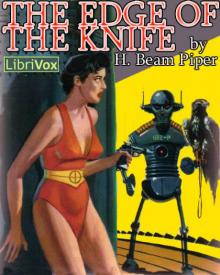 The Edge of the Knife
The Edge of the Knife Genesis
Genesis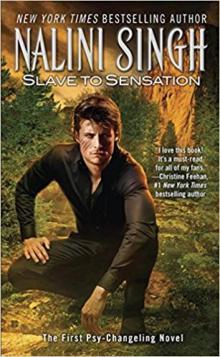 A Slave is a Slave
A Slave is a Slave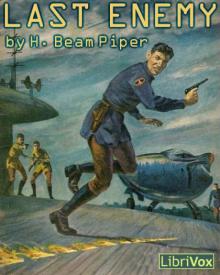 Last Enemy
Last Enemy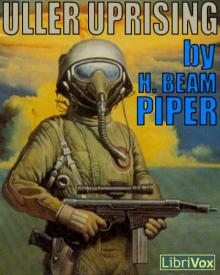 Uller Uprising
Uller Uprising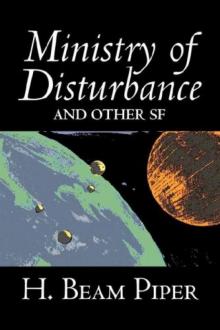 Ministry of Disturbance
Ministry of Disturbance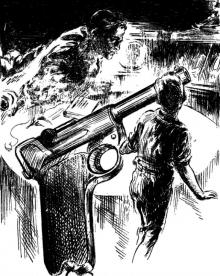 Time and Time Again
Time and Time Again The Mercenaries
The Mercenaries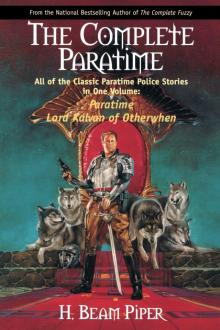 Police Operation
Police Operation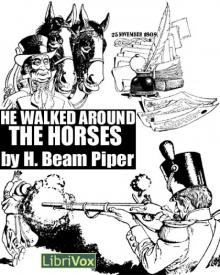 He Walked Around the Horses
He Walked Around the Horses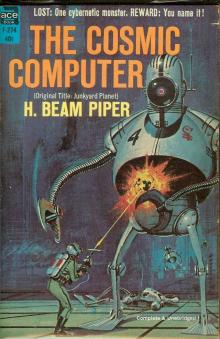 Time Crime
Time Crime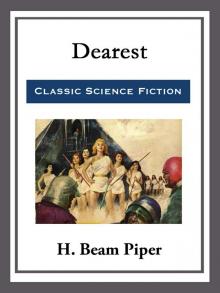 Dearest
Dearest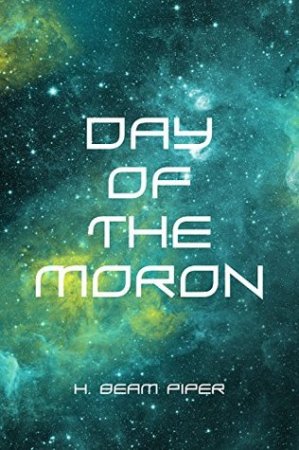 Day of the Moron
Day of the Moron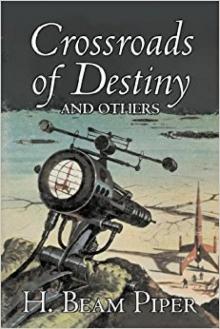 Crossroads of Destiny
Crossroads of Destiny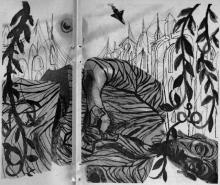 Graveyard of Dreams
Graveyard of Dreams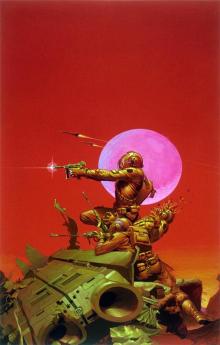 The Cosmic Computer
The Cosmic Computer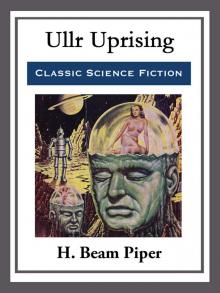 Ullr Uprising
Ullr Uprising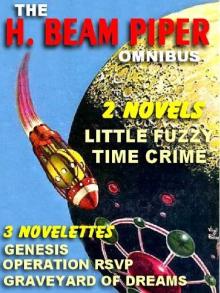 Operation R.S.V.P.
Operation R.S.V.P.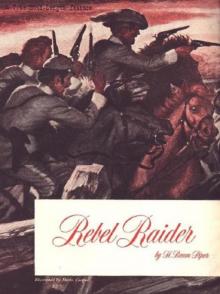 Rebel Raider
Rebel Raider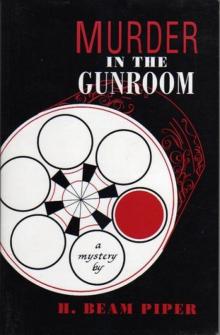 Murder in the Gunroom
Murder in the Gunroom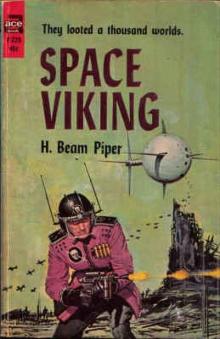 Space Viking
Space Viking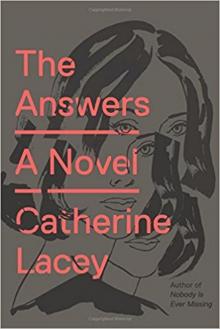 The Answer
The Answer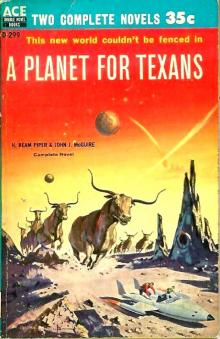 A Planet for Texans (aka Lone Star Planet)
A Planet for Texans (aka Lone Star Planet)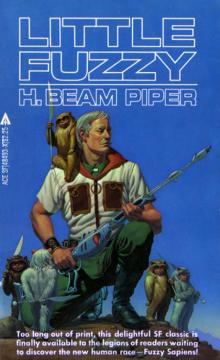 Little Fuzzy
Little Fuzzy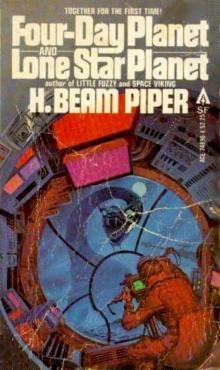 Four-Day Planet
Four-Day Planet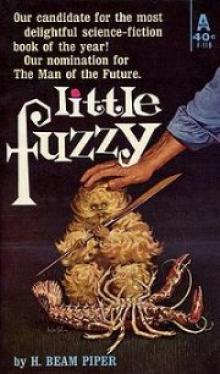 Little Fuzzy f-1
Little Fuzzy f-1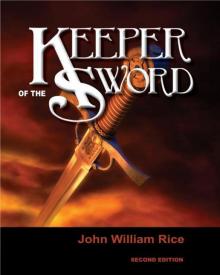 Keeper
Keeper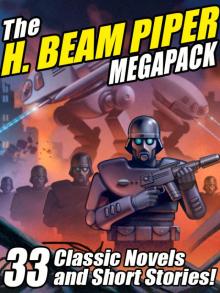 The H. Beam Piper Megapack
The H. Beam Piper Megapack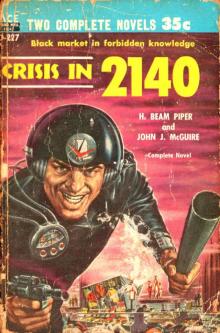 H. Beam Piper
H. Beam Piper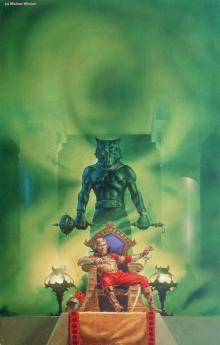 Lord Kalvan of Otherwhen
Lord Kalvan of Otherwhen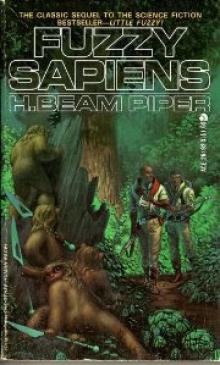 Fuzzy Sapiens f-2
Fuzzy Sapiens f-2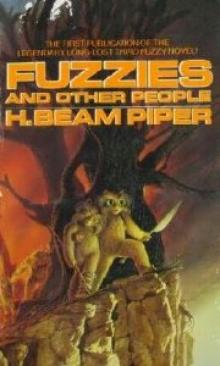 Fuzzies and Other People f-3
Fuzzies and Other People f-3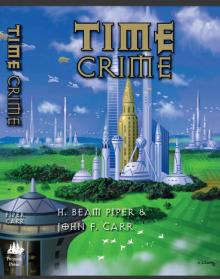 TIME PRIME
TIME PRIME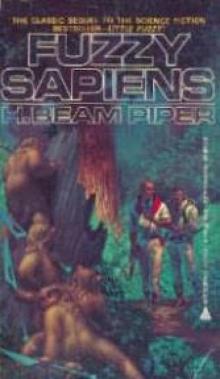 Fuzzy Sapiens
Fuzzy Sapiens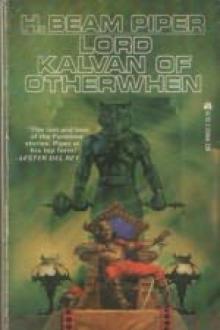 Lord Kalvan of Otherwhen k-1
Lord Kalvan of Otherwhen k-1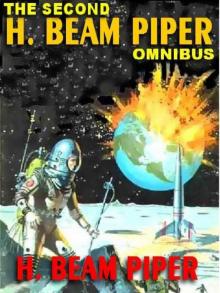 The Second H. Beam Piper Omnibus
The Second H. Beam Piper Omnibus